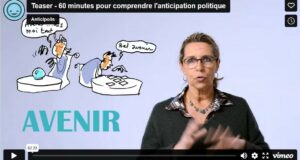On March 29, 2009, Franck Biancheri signed an open letter in the Financial Times international edition from LEAP/E2020 to the G20 leaders who were going to meet in London the next week. In its introduction, this text predicted that if the three recommendations it contained were not implemented as soon as possible, rather than a crisis of three to five years, the world would sink into a crisis for more than a decade.
Here we are two and a half years later and, alas, it is now clear that not only has the crisis revealed in 2008 not been resolved [1], but is getting worse instead now combining loss of confidence in paper currencies and the Western banking system [2], relapse of the world economy into recession, permanent rise in Western unemployment, explosive public debt in Western countries and growing unease of the emerging powers in front of an old order that refuses to think of its’ succession.
In 2009, LEAP/E2020 gave three pieces of strategic advice to the G20 leaders:
. in priority, create a new international reference currency to replace the US Dollar, which is now unable to hold the role of the pillar of the global monetary system
. at the same time ensure that the public authorities take control of the major banks which have become real “black holes” of liquidity, either by nationalization or other methods
. finally, carry out via the IMF, a thorough audit of the American, British and Swiss financial systems at the heart of the financial world.
Without these essential reforms and their rapid implementation in the six months following the G20 summit in London, we indicated that the “window of opportunity” would close for several years.
To complete these recommendations, the open letter stressed the importance of publishing a statement from the G20 which should be brief and easily understood by world public opinion in the absence of the power to curb people’s fears.
Today everybody realizes that almost three years have been lost since the same problems remain a burning issue [3].
But political anticipation is not a school of regret, but an instrument to help decision-making.
For LEAP/E2020 it is time, therefore, on the eve of the new G20 summit to be held in Cannes on 3-4 November 2011, to continue the effort begun in 2009. This effort is intended to prevent the world plunging into what Franck Biancheri calls “the tragic scenario for the 2010-2020 decade” [4] . And the time seems particularly favourable since, according to our team, a new “window of opportunity” will open in 2012, for a maximum period of two years.
A new window of opportunity for action by the G20 opens in 2012
In effect, during 2012, the leaders of almost half the G20 countries will be replaced. This will be the case for Mexico, South Korea, the United States, China, Russia, India, France, Italy and probably Germany [5]. From the end of 2012, the G20 Summit will, therefore, bring together political leaders mainly elected “in the crisis”, and not before the crisis as is now the case. On this basis, the preparation of summits for 2012, 2013 and 2014 will no longer be paralyzed and / or interfered with by the many “taboos”, “impossibilities” or, on the contrary, “now obsolete certainties” or “the obvious which is no more” belonging to the world before the crisis. In any case, this new generation of leaders will not be able to pretend they have discovered a situation for which it has not been prepared; and to paraphrase the conclusion of our 2009 open letter, it won’t be able to pretend either not to have been advised of the available opportunities to take the planet on a path of peaceful transition to the world after the crisis.
At the same time, the recent widespread awareness (since the beginning of the second half of 2011) of the fact that that everything remains to be done to try to overcome the global systemic crisis created, for a year or two at most, a situation conducive to political audacity. Exhausted by the consequences of the crisis and alarmed by the inefficiency of the steps taken to resolve it, public opinion everywhere is now ready to support or go along with major upheavals in the order that has prevailed in recent decades, both in socio-economic and geopolitical terms. But here also, keep in mind that this state of mind will only be positive if it is exposed to proposed ambitious solutions reflecting the interests of the vast majority and that otherwise, from 2013, it will metamorphose into destructive anger everywhere, targeting existing systems and leaders.
Having defined the conditions for the exercise of a first effective power by the G20, LEAP/E2020 advises the G20 leaders to focus on three strategic priorities in 2012/2013. We emphasize the importance of a tight agenda, refusing dissemination over a wide variety of subjects. In fact, the complexity of the problem, namely the emergence of a new global governance, like the need to communicate to convince public opinion consisting of several billions of citizens in very diverse political, social, cultural, economic contexts, requires focus on the essentials.
The G20’s three strategic priorities for constructing the future from 2012/2013
And for LEAP/E2020, the essentials are contained in these three strategic priorities that fundamentally determine all the future architecture of global governance and, at the same time, purify the dangerous areas of the current system. Simply put, it’s a case of building the future whilst defusing the present from the bombs of the past.
First priority: From 2012 (at the latest) launch the process for creating a new global reserve currency. At this stage the simplest method would be to turn SDRs into this new global monetary instrument giving it a more “sexy” name of course, and retaining the currencies of the major economies in the basket defining its value: US Dollar, Euro, Yen, Yuan, Real, Ruble, the Gulf currency (if it emerges by then), South African Rand, and possibly gold, which de facto has once again become a safe haven currency. It’s a case of restructuring the world monetary system on the real economy, then exiting the “financial” currencies such as the Pound sterling or the Swiss Franc.
Technical problems do not exist. The expertise exists within the international institutions to carry out all the work required to create such a currency within a year. The difficulty exclusively arises, therefore, from the emergence of a determined political will from the G20 to keep to a schedule of two years to create and launch this new currency.
This willingness, and the decisional weight necessary and sufficient to bring it to fruition, will potentially exist in a subgroup of the G20 consisting of Euroland, the BRICs, and several other emerging countries. The political changes at the head of the main Euroland countries like the current growing confrontation between Euroland on the one hand and Wall Street and the City on the other will create, in the next 12 months at most, the perfect conditions for a Euroland-BRICS convergence on such an agenda.
It’s starting with this “creative” core that the G20 summit’s agenda in late 2012 must be prepared which will include of course, otherwise nothing will happen, a radical reform and with immediate effect of the composition of the capital and caucus of the major global organizations (IMF, World Bank, WTO, UN Security Council) [6]. At the rate of evolution of the crisis, in 2012, neither Washington nor London will no longer be able (even if they still wanted to [7]) to oppose the creation of this new global reference currency.
The vision and determination of Euroland leaders [8], the BRICs and other emerging countries in the G20 will be the only factors of the success or failure of this fundamental reform without which the current international monetary system will continue to sink into increasing chaos year after year, producing terrible setbacks for world trade, the global economy and international cooperation, all whilst fueling the rise in unemployment and the impoverishment of Western middle classes, and considerably slowing down the development of emerging economies.
Without a “reliable standard” there is no stable economic and financial system. It’s here that this priority is strategic: without it, nothing significant or lasting can be done since any measure is corrupted by a standard (the US Dollar) which has become weak, elastic and unpredictable.
Second priority: Put all the world’s major financial institutions under public tutelage, wholly or partly, from the beginning of 2013 at the latest. The list is known already since it’s those that, at the request of the G20, the Financial Stability Board qualify as carrying systemic risk. To which should be added the BRICs and emerging countries’ major institutions because it is obvious that many of them will become “systemic” in the next five years. The objective in this area is twofold: first to ensure that these institutions resist speculative temptations – although we already know that it isn’t possible to trust their leadership and / or private shareholders in this area; second, to organize a “gentle deflation”, which doesn’t break the real economy, of the virtual economy. Any country refusing such a policy will have their establishments concerned blacklisted, just like what has been tried unsuccessfully for tax havens. Without success, because there was no determined political will on the subject, and especially because it’s not the tax haven that speculates … it is the major bank that uses it. This time, the G20 has no room for error: neither mistaking the target, nor the method.
Third priority: At the end of 2012 launch a huge ten-year public infrastructure programme on a world scale. In the term “infrastructure”, LEAP/E2020 particularly includes all essential public services such as education, access to medical care and basic services (water, electricity, telecommunications) and some symbolic science programs (medicine, space and energy). Through this bias of supporting effective and sustainable [9] global growth by the best and safest use [10] of the current imbalances in financial resources: the countries benefiting from substantial surpluses finding a useful and safe means of recycling them. It’s also, in our opinion, the only way to put a stop to the accelerated evaporation of trillions of US dollar assets generated by the current financial crisis and economic recession. Imagine a budget of one trillion Euros (a symbolic figure in communication terms) split into two geopolitical envelopes: one for infrastructure or projects involving many regions of the world; the other focused on a single region or one country. Western countries should also benefit because otherwise we remain in the logic of the world before the crisis and their economies and because their economies also need a big hand (especially the United States as regards infrastructure).
To conclude this second piece of advice to the G20 leaders in less than three years, LEAP/E2020 wishes to draw their attention to a fundamental methodological point. The content and form are closely related, it is essential that from the end of 2012 the world should be able to see a radical change in the process of the geographic location of the G20’s work, and beyond, from 2013, global governance. The urgency and complexity of the G20’s work in this period justifies the holding of two G20 summits per year. After that planned in Mexico mid-2012, it is necessary to make provision for one in the last quarter of 2012 so that all the new leaders elected during the year can begin to bring their weight to bear on the institution’s work and agenda.
In addition, from this date, it would be desirable, for obvious reasons of global credibility, that the summits leave the Atlanticist fold [11] to be held with the emerging powers: China, Brazil, India and Russia seem obvious choices, to show that the G20 is not a G7 decorated with invited countries. No doubt this will help to radically progress the agendas, an indispensable condition for overcoming the crisis.
Finally, in this sense, it is inevitable that from 2013/2014 the discussion will start on the relocation of major international institutions to ensure that the geography of global governance after the crisis reflects the real world and not that of 1945. Far from being details, these changes go to the heart of the decision making process and will be tremendous assets in convincing public opinion so it really feels that there is indeed an historic change taking place in the minds of those who lead them and not just in their meetings’ press releases.
Speaking of method, we have to explain to our subscribers what we have chosen for this “G-20 2011Action” [12]. This year LEAP/E2020 has chosen a very different approach from that adopted in 2009. There will be no open letter published in the Financial Times or any other international newspaper: first, because LEAP/E2020’ audience today is wide enough to no longer need an intermediary [13]. Secondly, because it’s time to no longer depend on the Anglo-Saxon media, whose international coverage reflects “the world before the crisis”, to communicate such messages aimed at preparing “the world after the crisis”. Thus we reaffirm by example that the content and form are closely linked to ensure coherent action and discussion, thus ensuring maximum effectiveness for the effort undertaken.
This advice will, therefore, be distributed to GEAB subscribers initially then exceptionally [14] posted publicly on the website in mid-October, two weeks before the Summit in Cannes. Meanwhile, for the last six months, in partnership with LEAP and Anticipolis editions, Franck Biancheri , LEAP/E2020 Director, has begun an operation to distribute the international edition [15] of his book “The World Crisis: The Path to the World Afterwards” and LEAP/E2020’s work with diplomats and special advisers from all countries participating in the G20 summit in Cannes [16]. Moreover, we can only praise the very positive welcome received to date by almost all the countries concerned. This awareness work will continue right up to the summit itself in early November.
Also read PDF-version below
[1] Contrary to what the majority of the political, financial and economic leaders have unceasingly maintained during these last two years.
[2] Of which gold’s return to the forefront as a safe haven is the best indicator.
[3] In addition, LEAP/E2020 recommended that the Eurozone leaders, from 2007, establish a Euroland governance as soon as possible. We recall here that the term Euroland, which has become very fashionable, was created by Franck Biancheri and used for the first time in an article entitled “2004 or the birth of Euroland”, published the 02/11/2004 in NewropMag .
[4] In his book « World crisis: The Path to the World Afterwards » published at the end of 2010 by Editions Anticipolis .
[5] Where the prospect of early elections is very likely.
[6] If the G20 wants to be at the heart of global governance, the leaders who participate must act as political leaders on a scale that addresses and resolves the major issues, and not as managers discussing technical issues.
[7] Which would be the proof for LEAP/E2020 that their leaders lack vision for their countries’ medium and long term interests; because, anyway, the developments in this area are inevitable. The only question to ask is: will this be done as part of a peaceful and controlled process or via a decade of all sorts of conflict?
[8] And their advisors.
[9] By means of a decennial programme taking into consideration the requirements in terms of energy savings .
[10] The other option consists of seeing their surplusses continue to lose value due to the crisis.
[11] Since the end of 2008 summits have been held in Washington, Pittsburgh, Toronto and Seoul. The next will be held in Cannes and the following in Mexico. These are very American-centred locations. Source: Wikipedia.
[12] And this is especially true since many of you ask us how we can share our analyses at the highest level.
[13] See the information on LEAP/E2020 site traffic, which has become the site on the global crisis benefiting from the largest global audience. Source: LEAP, 08/21/2011.
[14] We are sure that GEAB subscribers will understand this bending of our rule of waiting three months before eventually putting any excerpts from a GEAB issue in the public domain.
[15] English, German, Spanish and Italian versions.
[16] Who will, of course, receive the advice formulated here by LEAP/E2020.


 LEAP2040 Toutes les informations et archives Europe2040
LEAP2040 Toutes les informations et archives Europe2040


